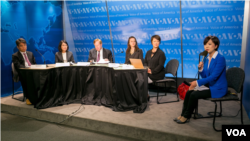Outside media is quietly and on a small scale reaching and influencing the people of North Korea. Also, many access outside media at least once a day. Those were just two of the surprising revelations that came out of a special panel discussion held at the Voice of America.
With the U.S./North Korea summit fast approaching, Voice of America’s Korean service hosted Engaging North Korea through Media: Opportunities and Challenges, a panel discussion with experts who follow the ever-changing dynamics of North Korea and the impact of policy decisions relating to its people and government.
The discussion was moderated by VOA Korean’s Eunjung Cho and featured Korean service chief Dong Hyuk Lee, Marie Dumond and Ambassador Robert R. King, PhD, of the Center for Strategic and International Studies (CSIS), Jean H. Lee of the Wilson Center’s Korean division and Kang Insun of Chosun Ilbo as panelists for the event.
VOA Korean service chief Dong Hyuk Lee focused on the current state of foreign media in North Korea. Lee’s long-standing interest in inter-Korean politics and the U.S. role in Korean affairs, made him an ideal panelist for the roundtable discussion. Lee talked about the growing influence of foreign media in North Korea, especially VOA’s seven hours daily of news and information which reaches North Korean elites. VOA’s documentary programming and talk shows leave him optimistic about the future of the isolated country.
Ambassador Robert R. King, Ph.D. is a senior adviser for CSIS in their Korean division and previously served as special envoy for North Korea human rights issues at the U.S. Department of State. When asked for his thoughts regarding U.S. government efforts in North Korea, he said he believed BBG programming is the backbone of those efforts and has seen significant changes taking place in North Korea. Unfortunately, King finds North Korea’s attitude has not changed significantly as the country desires to keep a monopoly on outside information. Nonetheless, King notes North Koreans are interested in outside media and culture, as “access to information is more important than it’s ever been.”
Kang Insun is Washington bureau chief and former member of the editorial board at The Chosun Ilbo and has extensive experience covering North Korean issues, international affairs, and Korean politics. When asked about South Korea’s efforts in engaging North Korea, she spoke of the diverse programming available to North Koreans, including the popular music genre K-Pop, weather and sports. Kang stated, this is in fact how many North Koreans learn about popular culture in South Korea. Many of the institutions attempting to engage the North Korean public are run by the government, private sector and human rights groups.
Jean H. Lee is a program director with the Wilson Center’s Korean division and a Pulitzer-nominated veteran foreign correspondent and expert on North Korea. Lee believes the current regime is one that is seen as more willing to embrace the outside world, but still demands a tight control of media and information. North Koreas 3G network allows for more communication between its citizens and foreign content, including educational programs, but the vetted intranet still leaves much to be desired by those hoping for a freer North Korea. She hopes that the current North Korean administration will engage more with the U.N. in the future.
Ms. Marie DuMond is associate director and associate fellow with the office of the Korea Chair at CSIS, where she manages projects that focus on major policy issues of common importance to the people of the Republic of Korea and the United States. DuMond was involved in the polling of small groups of North Koreans and found the majority accessed foreign media at least once per day. Of course, the price of accessing certain western programming could bring a hefty prison sentence and/or death. DuMond hopes to see more surveys of North Koreans in the future to give further insight into North Korean thought.




